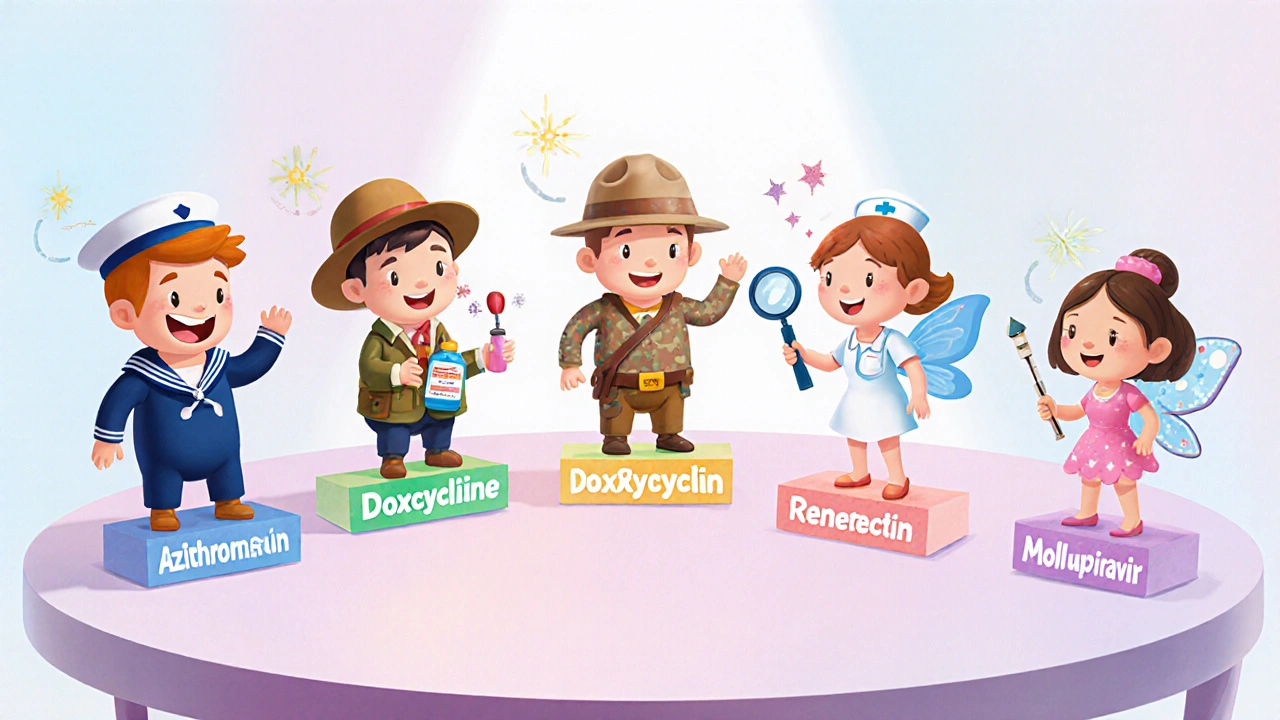Treatment Selection Advisor
Treatment Selection Advisor
This tool helps you determine which COVID-19 treatment might be most appropriate based on patient characteristics and treatment considerations. Input your patient's details below to receive a recommendation.
Treatment Recommendation
Select patient characteristics to see treatment recommendations.
Looking for a clear side‑by‑side look at Hsquin and its rivals? This guide walks you through what hydroxychloroquine actually does, why it sparked so much debate, and how it stacks up against the most talked‑about alternatives on the market today.
What is Hsquin (Hydroxychloroquine)?
Hydroxychloroquine is an antimalarial medication that also serves as an immunomodulator. In the United States it’s sold under brand names like Plaquenil, while the informal label “Hsquin” popped up on social media during the COVID‑19 pandemic. The drug was first synthesized in the 1950s and has been used for decades to treat malaria, lupus, and rheumatoid arthritis.
How does Hydroxychloroquine work?
The molecule interferes with the parasite’s ability to digest hemoglobin, but for autoimmune diseases it tampers with the signaling pathways that drive inflammation. Early lab work suggested it could raise the pH inside cellular compartments where viruses replicate, which sparked hopes it might block SARS‑CoV‑2. Real‑world evidence, however, turned out to be mixed.
FDA and WHO stance
The Food and Drug Administration (FDA) granted an Emergency Use Authorization for COVID‑19 in March 2020, then revoked it in June 2020 after larger trials showed little benefit and potential heart risks. The World Health Organization (WHO) suspended its Solidarity Trial arm that included hydroxychloroquine in October 2020.

Key alternatives that gained attention
While hydroxychloroquine was in the spotlight, several other drugs were studied or repurposed for viral infections. Below are the most frequently mentioned candidates.
- Azithromycin - a macrolide antibiotic sometimes paired with hydroxychloroquine in early protocols.
- Doxycycline - another antibiotic with anti‑inflammatory properties.
- Ivermectin - an antiparasitic that sparked worldwide debate over off‑label use.
- Remdesivir - an antiviral originally developed for Ebola, later approved for hospitalized COVID‑19 patients.
- Molnupiravir - an oral antiviral that received emergency use authorizations in several countries.
Comparison table: efficacy, safety, and regulatory status
| Drug | Primary Indication | COVID‑19 Efficacy (clinical trials) | Major Safety Concerns | Regulatory Status (US) | Typical Cost (USD per course) |
|---|---|---|---|---|---|
| Hydroxychloroquine | Malaria, lupus, RA | No significant reduction in mortality; modest reduction in viral load in early, small studies | QT prolongation, retinal toxicity (long‑term) | Not authorized for COVID‑19 | $5-$15 |
| Azithromycin | Bacterial respiratory infections | Mixed results; no clear benefit when used alone | Cardiac arrhythmias, especially with QT‑prolonging drugs | Off‑label only | $10-$30 |
| Doxycycline | Acne, tick‑borne diseases | Limited data; some studies suggest reduced progression in mild cases | Photosensitivity, GI upset | Off‑label only | $20-$40 |
| Ivermectin | Parasitic infections | In vitro inhibition but no convincing clinical benefit | Neurological toxicity at high doses | Not approved for COVID‑19 | $10-$25 |
| Remdesivir | Viral hepatitis, Ebola (investigational) | Shortens hospital stay in severe cases; modest impact on mortality | Liver enzyme elevation, renal toxicity | FDA‑approved for hospitalized COVID‑19 | $2,500-$3,500 |
| Molnupiravir | Influenza‑like viruses (experimental) | Reduces risk of hospitalization in high‑risk outpatients by ~30% | Potential mutagenicity (theoretical), GI upset | Emergency use authorization (outpatient) | $700-$900 |
When might you choose each option?
Doctors weigh three main factors: disease severity, patient comorbidities, and drug accessibility. Here’s a quick rule‑of‑thumb:
- Hydroxychloroquine: Best reserved for patients already on it for lupus or rheumatoid arthritis who contract COVID‑19; abrupt stopping may worsen their underlying disease.
- Azithromycin or Doxycycline: Consider for bacterial co‑infection or when an anti‑inflammatory antibiotic is needed, but avoid combining with other QT‑prolonging meds.
- Ivermectin: Not recommended outside clinical trials; the risk‑benefit ratio is unfavorable.
- Remdesivir: Ideal for hospitalized patients requiring supplemental oxygen but not on mechanical ventilation.
- Molnupiravir: Suitable for high‑risk outpatients who can start therapy within five days of symptom onset.
Side‑effect checklist for patients and clinicians
- Monitor ECG for QT interval length when prescribing hydroxychloroquine or azithromycin together.
- Check liver function tests before starting remdesivir.
- Advise patients on doxycycline to use sunscreen and avoid excessive sun exposure.
- Screen for renal impairment before giving ivermectin at higher doses.
- Discuss potential drug‑drug interactions with any antiviral, especially with anticoagulants.
Practical takeaways
Summing up, the science has largely moved hydroxychloroquine out of the COVID‑19 frontline. Alternatives like remdesivir and molnupiravir have clearer efficacy signals, though they come with higher price tags. When you’re deciding, ask:
- Is the patient already on hydroxychloroquine for another condition?
- Do they have cardiac risk factors that make QT prolongation dangerous?
- Can they access an IV medication like remdesivir, or do they need an oral option?
- What’s the cost burden for the individual or health system?
Answering these questions will help you choose the safest, most effective regimen without unnecessary trial‑and‑error.
Frequently Asked Questions
Can hydroxychloroquine prevent COVID‑19 infection?
Large randomized trials have shown no protective benefit for healthy people. It’s only useful for patients who already need it for lupus or arthritis.
Is it safe to combine hydroxychloroquine with azithromycin?
Both drugs can lengthen the QT interval, increasing the risk of serious heart arrhythmias. If a clinician decides to use the combo, they must monitor the ECG closely.
Why did the FDA revoke the emergency use authorization?
The revocation followed data from the RECOVERY and SOLIDARITY trials showing no mortality benefit and a higher incidence of cardiac events.
How does remdesivir differ from molnupiravir?
Remdesivir is administered intravenously in a hospital setting and works by halting viral RNA replication. Molnupiravir is an oral pill that introduces errors into the viral genome, making it easier for outpatients to take.
Should I use ivermectin for COVID‑19?
Current guidelines from the WHO and FDA advise against using ivermectin outside of clinical trials because evidence of benefit is weak and safety at high doses is uncertain.

Diane Thurman
October 22, 2025 AT 19:43This guide is a total hot mess – the author totally missed the mark on real‑world data. Hydroxychloroqine was never meant to be a covid miracle, and the side‑effects are glossed over. The table feels cherry‑picked, and the safety warnings are buried in footnotes. If you’re looking for solid evidence, you’ll come up empty‑handed here.
Sarah Riley
October 22, 2025 AT 21:06The epistemic fallacy inherent in this narrative reduces complex pharmacodynamics to a binary hype construct. Pragmatic meta‑analysis is omitted, rendering the discourse vacuous.
Jai Reed
October 22, 2025 AT 22:30Let me be absolutely clear: you cannot ignore the established clinical trial data. Hydroxychloroquine shows no mortality benefit, and its cardiac risks are well‑documented. If a patient is already on the drug for lupus, continuation may be justified, but prescribing it solely for COVID‑19 is unjustified and potentially harmful.
WILLIS jotrin
October 22, 2025 AT 23:53It’s interesting how the conversation swings between hype and dismissal. From a philosophical standpoint, the truth often lies in the middle ground where evidence informs practice rather than ideology driving it.
Vin Alls
October 23, 2025 AT 01:16Picture this: a drug that once fought malaria now tangled in a pandemic drama, sharing the stage with antivirals that cost a fortune. While remdesivir and molnupiravir command headline money, hydroxychloroquine quietly remains a cheap, albeit controversial, player.
Bret Toadabush
October 23, 2025 AT 02:40They dont want you to see the real story – the big pharma lobby pulled the plug on Hsquin once the data got messy. The FDA revocation was a cover‑up, and the media hype was just a distraction from the truth they are pushing.
Iris Joy
October 23, 2025 AT 04:03Remember, every medication has a place when used responsibly. For patients already managing lupus, stopping hydroxychloroquine abruptly could trigger a flare. Talk to your rheumatologist before making any changes, and weigh the cardiac risk against the benefits you’re already receiving.
Tammy Sinz
October 23, 2025 AT 05:26From a mechanistic perspective, hydroxychloroquine modulates endosomal pH, which theoretically could impair viral entry. However, clinical pharmacokinetics reveal that achieving those concentrations in vivo would require doses that are unsafe, leading to QT prolongation and retinal toxicity.
Christa Wilson
October 23, 2025 AT 06:50Great breakdown! 👍 This really helps clear up the confusion around the options. 🙌
John Connolly
October 23, 2025 AT 08:13Glad you found it useful! If you’re considering molnupiravir for a high‑risk patient, make sure they start within five days of symptom onset to maximize efficacy. And always double‑check for drug‑drug interactions.
Wade Grindle
October 23, 2025 AT 09:36When evaluating therapeutic options for COVID‑19, it is essential to adopt a systematic framework that incorporates efficacy, safety, accessibility, and cost. The first pillar, efficacy, should be grounded in robust randomized controlled trials rather than anecdotal reports or in‑vitro studies. Hydroxychloroquine, despite early laboratory promise, consistently failed to demonstrate a statistically significant reduction in mortality across large phase III trials. In contrast, remdesivir showed a modest benefit in shortening hospital stays, while molnupiravir reduced the risk of hospitalization by roughly thirty percent in outpatient cohorts. The second pillar, safety, requires careful assessment of each drug’s adverse‑event profile. Hydroxychloroquine’s propensity for QT interval prolongation can precipitate life‑threatening arrhythmias, especially when combined with other QT‑prolonging agents such as azithromycin. Remdesivir carries risks of hepatotoxicity and renal impairment, necessitating baseline laboratory monitoring. Molnupiravir’s theoretical mutagenic potential has sparked academic debate, though clinical data have not demonstrated mutagenesis at therapeutic doses. The third pillar, accessibility, reflects real‑world constraints; hydroxychloroquine is inexpensive and widely available, whereas remdesivir demands intravenous administration in a hospital setting, limiting its use to severe cases. Molnupiravir, as an oral medication, bridges the gap between efficacy and convenience but remains costly for many health systems. The final pillar, cost, cannot be ignored, especially for resource‑limited settings where a $10‑$15 course of hydroxychloroquine may be the only affordable option. However, deploying a cheap drug with negligible benefit may divert resources from more effective therapies. Ultimately, clinicians must weigh these pillars against individual patient factors, such as comorbidities, disease severity, and pre‑existing medication regimens. By integrating evidence‑based data with personalized assessment, healthcare providers can make rational choices that optimize outcomes while minimizing harm. This balanced approach supersedes the binary narratives that have dominated public discourse throughout the pandemic.